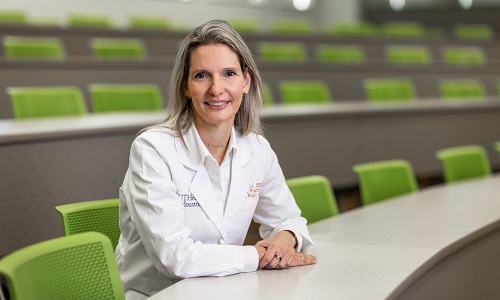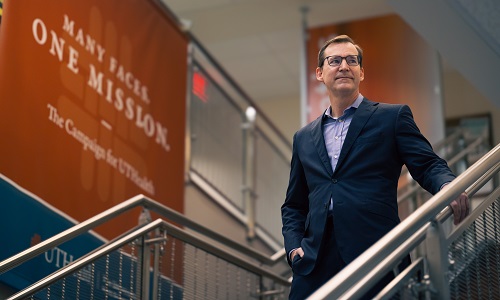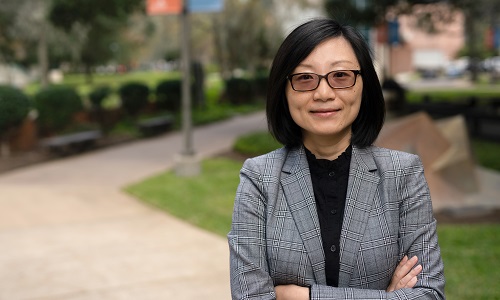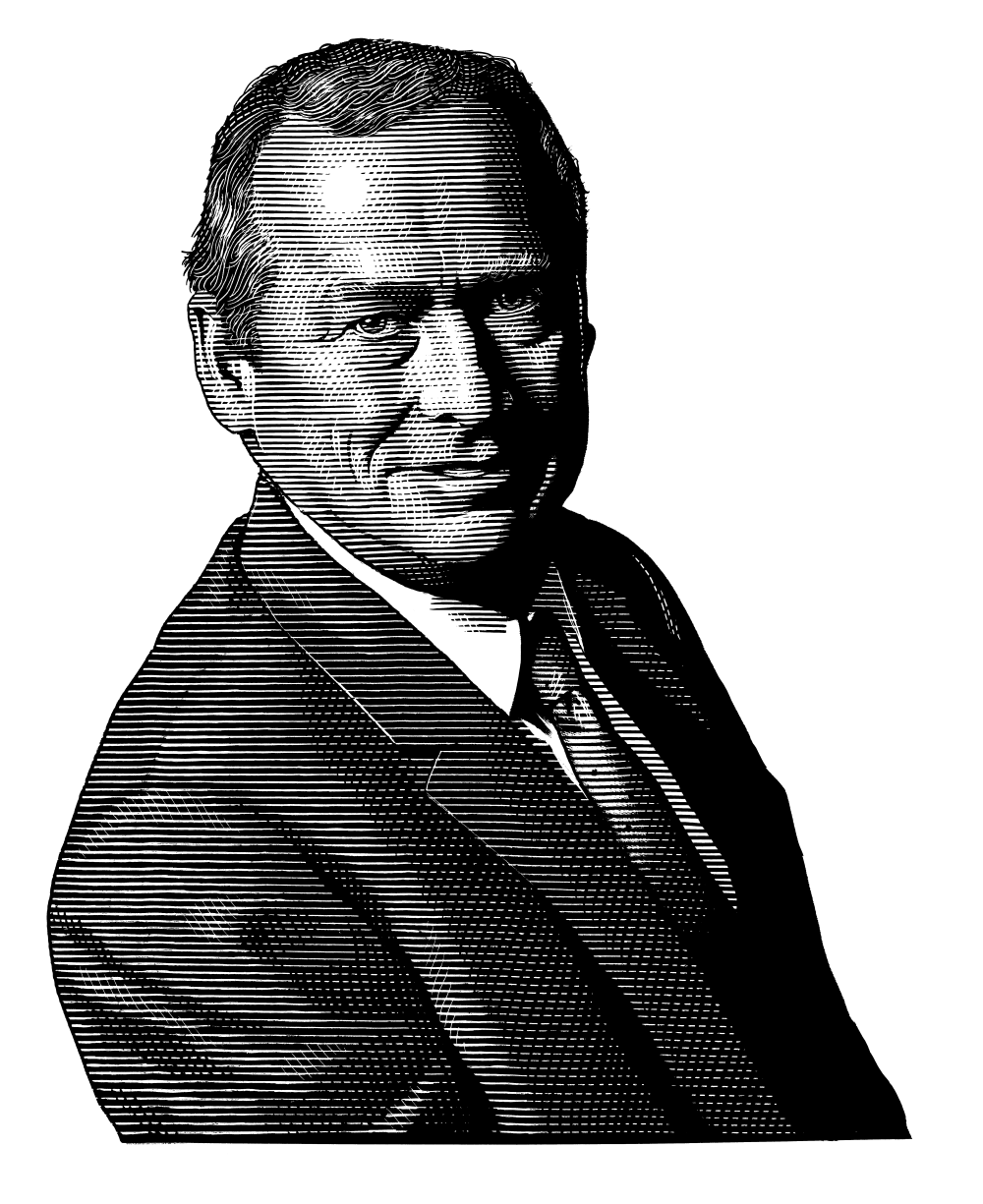
Wings of generosity
Support from endowments lifts UTHealth Houston faculty
Flight begins with liftoff, a boost that propels us away from familiar ground toward rarified air. At UTHealth Houston, endowed funds provide resources in perpetuity that set our faculty on trajectories to new heights as they conduct life-changing work and train the next generation of health professionals, who will meet future health challenges head-on.

Furthering a dental legacy
Ana Neumann, DDS, PhD, Gene C. Stevenson Distinguished Professor in Dental Education at UTHealth Houston School of Dentistry, carries the name of her late mentor and friend in a special way. As holder of the Gene C. Stevenson Distinguished Professorship in Dental Education, she pursues the same goals that drove them both as dentists.
“I still miss him today,” she says of Stevenson, who served as faculty at UTHealth Houston School of Dentistry for 25 years before passing away in 2016. “He was a wonderful, dedicated faculty member and a real scholar.”
When Neumann met Stevenson after joining the School of Dentistry faculty in 2010, she found they shared a commitment to evidence-based dentistry, and both held Master of Public Health degrees. Neumann earned a master’s degree and later a doctorate at UTHealth School of Public Health as the only dentist in her class.
“I could never dissociate dentistry and public health because really everything we do is public health,” she says.
She and Stevenson shared a goal of teaching students how to analyze data to determine the best dental practices based on the evidence. They worked together to redesign the curriculum for students in dental public health classes, adding lectures to familiarize students with how to critically appraise scientific literature.
“I maintain these lectures in my course with special dedication to Dr. Stevenson,” says Neumann, who directs the dental public health program at the School of Dentistry. “I still use his slides.”
Today, she sees a wide range of possibilities for using funds from the Stevenson Distinguished Professorship, which was founded by Stevenson’s widow, Lori, to honor his memory and advance evidence-based dentistry and critical thinking. Potential uses include creating research opportunities for faculty at the School of Dentistry and supporting the school’s clinic for patients with special needs.
“Dr. Stevenson was helping patients with HIV when it was hard to get a dentist to do that,” Neumann says. “Following that example, this endowment helps us care for patients who might have a hard time finding treatments elsewhere.”
Neumann also teaches her students to evaluate evidence, think critically, and uphold the highest standards of dentistry. “If we can equip them with the best possible knowledge, they can really make a difference in a lot of people’s lives,” she says.

Surgical training gets a makeover
In a world with nearly unlimited information at the touch of a smartphone screen, medical students and residents have access to more knowledge than ever before—and more ways of learning it.
Todd D. Wilson, MD, Associate Professor, has watched this transformation take shape with the residents he teaches in the Department of Surgery at McGovern Medical School at UTHealth Houston. Where surgical procedures were once the purview of textbook diagrams or firsthand observation, today’s future surgeons have found new ways to study.
“It turns out our residents prefer short videos that demonstrate specific techniques,” he says. YouTube offers a plethora of such videos and has drawn the attention of residents, but Wilson points out the lack of quality control on the platform. Yet even with his concerns, he believes video learning can play a key role in supplementing textbooks, which may not reflect the most recent advances in surgical technology.
“Given the time constraints residents have, YouTube-style videos could actually serve as great educational tools,” Wilson says. “The problem is that we only have a few resources with good videos vetted by experts.”
A computer programmer in his spare time and an official Apple software developer, Wilson saw an opportunity to blend YouTube learning with trusted medical expertise.
With support from the Glassell Family Research Innovation Endowment, he launched a collaboration with UTHealth Houston School of Biomedical Informatics to create an app with short instructional videos vetted by a committee at McGovern Medical School. The app will use artificial intelligence to predict what residents may be looking for and help them find the right videos more quickly.
While the first videos will focus on specific surgeries, Wilson hopes to expand the effort into different fields and institutions outside UTHealth Houston.
“I greatly appreciate what the Glassell family has done in catalyzing this effort, which taps the incredible potential of emerging technologies like machine learning,” he says. “I see this as only the beginning of what is possible.”

Saving organs, saving lives
Rapid advances in medical technology have given UTHealth School of Public Health researcher Bing Yu, PhD, Associate Professor and The JLH Foundation Chair in Transplant Prevention, an unprecedented window into the inner workings of the human body.
Able to view tens of thousands of biomarkers—molecules that indicate either normal processes or disease—many of them never before explored, her team has made significant progress in finding markers associated with potentially fatal conditions like heart disease.
“We all have good and bad things in our body, so we want to evaluate everything,” she says. “When we identify these markers, we can see how much risk a person might have for future disease.”
In 2016, Yu and Eric Boerwinkle, PhD, were researching the mechanisms of end-stage heart and kidney failure when their work caught the attention of the JLH Foundation, which was founded to help support the financial needs of transplant patients and their families and to support transplant programs and research. They met with met Paula Hern, Chair of the JLH Foundation; her husband and foundation trustee, Tom Barbour; and trustee Ellis Tudzin. Intrigued by the potential of this research to prevent organ failure and thus the need for transplants altogether, the JLH Foundation made a substantial commitment to fund their work.
Less than two years later, Yu and Boerwinkle uncovered a key compound linked to high blood pressure, a major contributor to kidney failure. They also found a gene that regulates compound levels, which could serve as a target for developing treatments.
“Once we have blood pressure under control, we can protect kidney function,” Yu says. “This could prevent people at high risk of kidney failure from needing transplants.”
Recognizing the potential for even greater discoveries, in 2021 the JLH Foundation established The JLH Foundation Chair in Transplant Prevention to advance research focused on precursors to organ failure like high blood pressure and diabetes. Yu was named the chair’s inaugural holder in 2021 and will use distributions to examine genes and biomarkers to identify patients at high risk for disease and discover new interventions.
“I am very honored to be the holder of this position,” Yu says. “There are still a lot of chronic diseases that do not have effective treatments, and this philanthropic support positions us to find solutions that save even more patients from the ordeal of organ transplants.”

“Faculty endowments like professorships, chairs, and research funds empower our educators to create unique experiences and programs that grow our students into tomorrow’s health care and public health leaders," says Eric Boerwinkle, PhD, Dean of the School of Public Health. "As health challenges evolve and new issues emerge, these endowments help bring the brightest minds to UTHealth Houston to train the professionals that will keep our communities healthy long into the future.”

